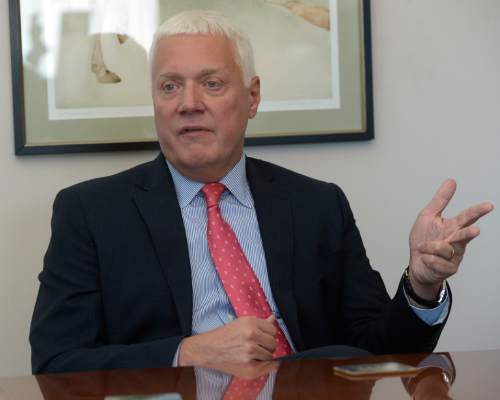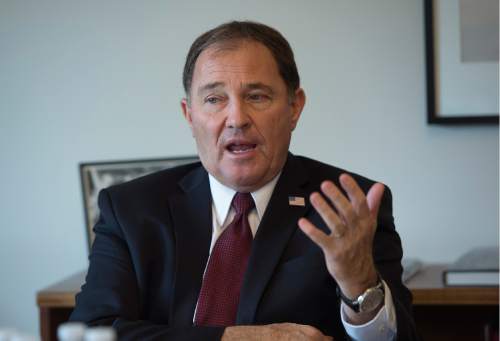This is an archived article that was published on sltrib.com in 2016, and information in the article may be outdated. It is provided only for personal research purposes and may not be reprinted.
Mike Weinholtz, the Democratic candidate for governor, says he loves teachers, loves public schools and wants to raise taxes on high-income earners to give them a boost. But there's a segment of the education system he's not a fan of — charter schools.
He sees the steady growth of these alternative taxpayer-funded schools that operate outside the traditional districts as a symptom of an under-supported system. And if elected, he'd set a goal of phasing them out.
"My personal belief is if we improve K-12 education we don't need charter schools," Weinholtz told The Salt Lake Tribune's editorial board recently. "To me charter schools are a reflection of our current Legislature's and governor's belief that they would like to privatize everything and they just generally don't believe in public education."
Utah now has 110 charter schools that educate roughly 74,000 students. Gov. Gary Herbert, a Republican who polls say has a big lead in his quest for re-election, is among the supporters of charter schools. Many charters boast of educational specialties or smaller class sizes, and Herbert argues their primary value is giving parents additional options.
"Governor Herbert believes that Utah parents should be the ones deciding this issue," said Marty Carpenter, the governor's campaign manager. "If a charter school isn't working, parents can vote with their feet and choose a new school. The governor believes that Utah parents need more choice for their children, not less."
Weinholtz believes charter schools get favorable treatment and sap resources from traditional schools. He would like to see them absorbed into existing school districts.
"You work them back into the system and make sure they have the same standards, the same level of funding," Weinholtz said. "Right now they arse being treated separately and favorably."
Royce Van Tassell, the executive director of the Utah Association of Public Charter Schools, notes that most states have a charter-school system and their growth is an indication that parents find the schools to be worthwhile.
"It is disappointing that Mr. Weinholtz doesn't appreciate how strongly Utah families want to have those kind of choices and options," Van Tassell said.
The gubernatorial candidates differ on a few other education issues. Weinholtz wants to raise taxes on Utahns making more than $250,000 annually, with most of the extra money going to higher education, though he said some of it could help boost K-12 teacher pay.
Herbert also wants to raise teacher salaries, though he wants to fund it by growing tax collections tied to the state's expanding economy. He said he won't propose a tax increase for education in this year's budget.
Pay is one reason Utah is facing a teacher shortage. The state school board is trying to ease that strain by granting teaching licenses to people with a bachelor's degree who can show an expertise in a subject.
Weinholtz said he understands the problem, but this shouldn't be the solution.
"Teaching is a real skill and a real profession," he said. "Every teacher I've talked to is insulted by it."
Herbert believes local school districts should have this option.
"In some schools, particularly in rural schools, it might make sense. In others, they will likely choose to stick with their current policy," Carpenter said. "The governor believes every Utah student deserves to be taught by a qualified, effective educator."
Both candidates want to move away from the state's SAGE test, a computer-adaptive test of English and math. And both said the state needs to create a more positive environment for teachers.
"I think we have a culture created by our current government that is disrespectful to teachers, not appreciative of teachers," Weinholtz said. "They are not treated like the professionals they truly are."
During his monthly KUED news conference last week, Herbert started with a thank you to teachers.
"Sometimes all they hear is criticism," he said. "We need to get away from that, make sure we have better dialogue and better appreciation."
Herbert said he's proud of the way he's boosted education funding in the past five years, including $458 million in the past year, a big chunk of which went to teacher supplies.
For Weinholtz, that is just a start. He wants more money and more planning, calling for a 10-year education plan, matching the state's 10-year transportation plan.
He said: "That tells me the governor thinks roads are more important than our schoolchildren."
Robert Gehrke contributed to this report.
Twitter: @mattcanham





